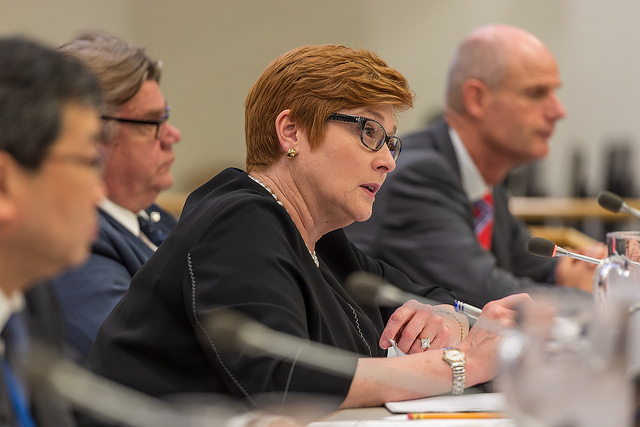
BEIJING — Australian Foreign Minister Marie Payne said Thursday that the government’s rejection of a Chinese bid to take over an energy infrastructure company does not indicate a change in the country’s openness to doing business with China.
Speaking after a meeting in Beijing with Chinese Foreign Minister Wang Yi, Payne stressed “the importance of Australia’s welcoming of Chinese investment in Australia.”
On Wednesday, Australia said it intends to block a Chinese and Hong Kong consortium’s 13 billion Australian dollar ($9 billion) bid to take over the APA group.
Payne said that the government judged that the acquisition would have resulted in “an undue concentration of foreign ownership by a single company group in what is our most significant gas transmission business.”
Her meeting with Wang was seen as a thaw in recently frosty relationship between the two economic partners after months of tension over accusations of Chinese interference in Australian politics, media and academia.
“I think the most important outcome of this dialogue is that we have reaffirmed the course of this relationship,” Wang said after the meeting, which ran an hour longer than scheduled.
Australia has banned Chinese giants Huawei and ZTE Corp. from new telecommunications projects, and an Australian security think-tank has raised concerns about increasing collaboration between Australian universities and China’s People’s Liberation Army scientists on research programs such as hypersonic missiles and navigation technology.
China took particular offence at a new law passed after allegations of Chinese meddling in Australian politics and media exposes about the Communist Party’s dealings with Chinese university students and the expatriate Chinese community in Australia.
China has denounced all accusations of interference as prejudiced “Cold War thinking” and alleges that Australia’s longstanding military alliance with the U.S. is intended to contain China’s growing influence. Australia and the U.S. have both challenged China’s territorial claims in the South China Sea with flybys and naval sorties.
Earlier, Australia announced it will invest in redeveloping a Papua New Guinea naval base as concerns mount over increasing Chinese influence in the South Pacific.